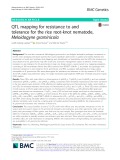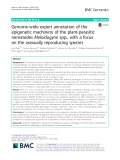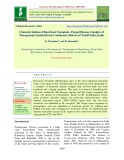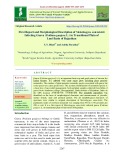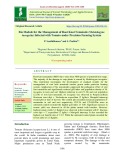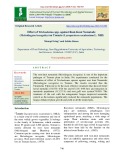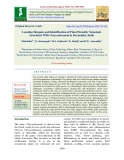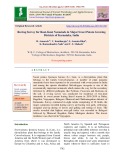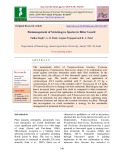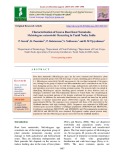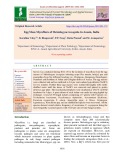
Meloidogyne species
-
QTL mapping for resistance to and tolerance for the rice root-knot nematode, Meloidogyne graminicola
The root-knot nematode Meloidogyne graminicola is an obligate biotrophic pathogen considered to be the most damaging nematode species that causes significant yield losses to upland and rainfed lowland rice production in South and Southeast Asia.
 17p
17p  vihagrid
vihagrid
 30-01-2023
30-01-2023
 5
5
 3
3
 Download
Download
-
The renewed interest in epigenetics has led to the understanding that both the environment and individual lifestyle can directly interact with the epigenome to influence its dynamics. Epigenetic phenomena are mediated by DNA methylation, stable chromatin modifications and non-coding RNA-associated gene silencing involving specific proteins called epigenetic factors.
 21p
21p  vibeauty
vibeauty
 23-10-2021
23-10-2021
 9
9
 1
1
 Download
Download
-
This study was aimed at identifying the root knot nematode, Meloidogyne species and the fungal organism that cause wilt disease in pomegranate. Based on the morphological means using posterior cuticular pattern and molecular characterization using internal transcribed spacer (TW81-AB28) region tools, the root knot nematode was identified as M. incognita.
 10p
10p  caygaocaolon11
caygaocaolon11
 21-04-2021
21-04-2021
 11
11
 1
1
 Download
Download
-
Guava (Psidium guajava L.) is an important fruit crop and good source of income for Indian farmers. It’s infested with some major pests including plant parasitic nematodes. The number of plant parasitic nematode species associated with guava but some species are cause great losses. The accurate identification of nematode species is a basic key of successful management. Soil and plant samples collected from fields of guava from Arathwara village, Sheoganjtehsil, Sirohi district of Rajasthan, India on the GPS location 250 03’40.7”N; 720 58’05.0”E.
 8p
8p  trinhthamhodang9
trinhthamhodang9
 16-12-2020
16-12-2020
 8
8
 1
1
 Download
Download
-
Root-knot nematodes (RKN) have more than 3000 species of potential host range. The majority of the damage to crop plants is caused by Meloidogyne incognita. This experiment investigates the development of standard module for the management of root knot nematode tomato grown under precision farming system; Application of bio nematicides suppressed the pathogenic effect of root knot nematode and significantly reduced gall index and population density of M. incognita in roots and soil.
 5p
5p  angicungduoc6
angicungduoc6
 22-07-2020
22-07-2020
 8
8
 1
1
 Download
Download
-
The root-knot nematode (Meloidogyne incognita) is one of the important pathogen of Tomato plant in India. Pot experiments conducted for the evaluation of effect of Trichoderma species against root knot Nematode (Meloidogyne incognita) in Tomato. The results revealed that the Treatments T4proved to be the most effective treatment that showed better larval mortality (54.55% @24 hrs and 65.12% @48 hrs) and reduction in nematode population (113.33 %) and root gall/ root system(74.89%.
 8p
8p  quenchua6
quenchua6
 15-06-2020
15-06-2020
 10
10
 2
2
 Download
Download
-
The Root-Knot Nematode (RKN), Meloidogyne arenaria, significantly reduces peanut grain quality and yield worldwide. Whilst the cultivated species has low levels of resistance to RKN and other pests and diseases, peanut wild relatives (Arachis spp.) show rich genetic diversity and harbor high levels of resistance to many pathogens and environmental constraints.
 16p
16p  vichoji2711
vichoji2711
 29-04-2020
29-04-2020
 11
11
 1
1
 Download
Download
-
The present study makes an attempt to identify the plant parasitic nematode associated with chrysanthemum in Karnataka. The primary data was collected using random sampling technique Bagalkote, Gadag, Dharwad and Belgum comprising total nine villages were selected for study during the year 2012-2014. The findings reveals that, the plant parasite nematode were found to be eight species, viz., Meloidogyne, Helicotylenchus, Tylenchulus, Xiphinema, Pratylenhus, Hemicyclophora, Hoplolaimus and Radopholus which were commonly found in the roots of commercially cultivated chrysanthemum flower crops.
 5p
5p  kethamoi4
kethamoi4
 16-04-2020
16-04-2020
 15
15
 0
0
 Download
Download
-
Sweet potato, Ipomoea batatas (L.) Lam., is a dicotyledous plant that belongs to the family Convolvulaceae. A number of plant parasitic nematodes have been reported to be associated with sweet potato in India and among the species identified, Meloidogyne incognita is one of the economically important nematode which makes the way for the secondary infection by different pathogens like Pythium, Fusarium and Ralstonia in the soil.
 10p
10p  caygaocaolon2
caygaocaolon2
 14-03-2020
14-03-2020
 10
10
 0
0
 Download
Download
-
The nematicidal effect of Purpureocillium lilacium, Pochonia chlamydosporia, Pseudomonas fluorescens singly or in combination were tested against root-knot nematodes under open field conditions. In the present study, the efficacy of four biocontrol agents was tested against Meloidogyne spp. The results revealed that soil application of vermicompost @2.5 tons/ha enriched with P. lilacinum @ 2.5 kg + vermicompost @ 2.5 tons of /ha enriched with P. fluorescens @ 2.5 kg/ha (T4) proved effective to manage root-knot nematode, Meloidogyne spp.
 8p
8p  caygaocaolon2
caygaocaolon2
 11-03-2020
11-03-2020
 17
17
 1
1
 Download
Download
-
Characterization of guava root knot nematode, Meloidogyne enterolobii occurring in Tamil Nadu, India
Root knot nematodes (Meloidogyne spp.) are the most common and destructive plant parasitic nematode group with wide host range of crops, including guava (Psidium guajava L.). Meloidogyne enterolobii (Syn:M. mayaguensis), the root knot nematode of the guava tree, belongs to the group of tropical root knot nematodes and is considered as one of the most damaging species, due to its wide host range, pathogenicity and ability to develop and reproduce on several crops carrying resistance genes.
 12p
12p  caygaocaolon3
caygaocaolon3
 09-03-2020
09-03-2020
 15
15
 1
1
 Download
Download
-
Root knot nematode Meloidogyne enterolobii cause considerable yield losses in guava. It is now an emerging menace in guava production. Many authors reported the resistant nature of Psidium cattleianum against M. enterolobii. P. cattleianum is a small tree or shrub with a smooth bark and leaves are obovate elliptic and glabrous. Fruits are round, having good aroma with sweet taste. The fruits of Psidium gujava are big in size, round, smooth skin, white or pink flesh, soft, firm, light yellow, pleasant flavor with few seeds. Mechanisms of resistance against M.
 6p
6p  nguathienthan2
nguathienthan2
 26-12-2019
26-12-2019
 7
7
 0
0
 Download
Download
-
Survey was conducted during 2014-15 for the isolation of mycoflora from the egg masses of Meloidogyne incognita infecting crops like tomato, brinjal, pea and ameranthus from five different locations viz., Charigaon, Alengmora, Danichopari, Namdeori and Barbheta of Jorhat and Golaghat district of Assam. The egg masses were collected and surface sterilized in 0.4 per cent sodium hypochlorite (NaOCl) for two minutes. Further these egg masses were washed thoroughly with sterile distilled water until the traces of NaOCl was removed and placed in potato dextrose agar plate.
 19p
19p  nguaconbaynhay1
nguaconbaynhay1
 04-12-2019
04-12-2019
 9
9
 0
0
 Download
Download
-
Objectives of the thesis: Identifying the Meloidogyne species causing damage on main crops in Tay Nguyen Highlands. Analyze the diversity of Meloidogyne species based on morphology and molecular classification. Assessing the preventative ability of antagonistic microorganisms to Meloidogyne incognita in laboratory condition.
 27p
27p  xacxuoc4321
xacxuoc4321
 08-07-2019
08-07-2019
 32
32
 5
5
 Download
Download
CHỦ ĐỀ BẠN MUỐN TÌM









